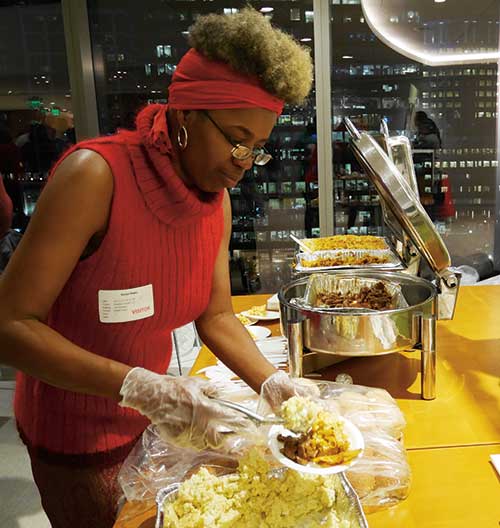The business of food
Entrepreneurship program grads share their creations and pitches

High above the evening bustle of Fan Pier in the Seaport District last Wednesday, Paulette Ngachoko of Hapi African Gourmet stood behind a table pouring creamy peanut sauce into tiny cups for sampling with rice or bread. A native of Cameroon who came to the U.S. 20 years ago, Ngachoko aims to introduce “ready-to-eat African-style food” here by bottling this traditional Cameroonian sauce — made from her mother’s recipe — and selling it to restaurants, institutions and stores.
On the Web
CommonWealth Kitchen: http://bit.ly/1j6Bc7L
Lawyer’s Committee Economic Justice Project: lawyerscom.org/projects/economic-justice
Get in touch: The next Food Biz 101 session begins in February 2018. For information and to be placed on an interest list for the session, send a note to foodbiz101@lawyer…

Author: Sandra LarsonRory Forde displays miniature versions of his signature pies.

Author: Sandra LarsonParticipants in the Food Biz 101 pitch competition offered samples of their products. Paulette Ngachoko prepares portions of her Cameroonian peanut sauce.

Author: Sandra LarsonVincent Li’s alcohol-flavored Eatable Popcorn won second place in the pitch competition.
At another table, Rory Forde offered samples of pumpkin bread, chocolate-coated cheesecake squares and several varieties of flaky-crust pie. Born and raised in Roxbury, the 33-year-old says he has been baking for friends and family for 15 years, and now aims to turn his passion into a business. With a plan to sell at area farmers markets and seek a storefront space, Forde hopes to locate Rory’s Pie Shop & Bakery somewhere in Dorchester, Mattapan or Roslindale.
“There aren’t a lot of pie shops in Boston,” Forde said. “I’m looking to showcase a homemade style.”
Ngachoko and Forde are part of a small group of aspiring food business entrepreneurs who have just completed Food Biz 101, a 12-week program co-organized by the food business incubator CommonWealth Kitchen and the Lawyers’ Committee for Civil Rights and Economic Justice.
Targeted accelerator
First piloted in Fall 2016, Food Biz 101 is an accelerator specially designed to address the nuts and bolts of starting a food-related business. Classes cover recipe scaling, cost of goods, labeling regulations, licensing and permitting as well as business practices such as public relations, marketing and entity formation.
While starting a business from scratch is challenging in any sector, food businesses bring some unique challenges with their typically low profit margins and complex permitting, sales and distribution systems. And for people who lack easy access to funding sources and networks of business contacts, the climb to success can be especially steep.
But once the entry hurdles are overcome, food businesses can offer owners a personally satisfying path to wealth-building and bring job opportunities to local communities.
“They’re powerful engines for closing the opportunity gap,” said Iván Espinoza-Madrigal, Executive Director of the Lawyers’ Committee for Civil Rights and Economic Justice. His organization’s Economic Justice Project works to help people in low-income communities develop sustainable businesses by connecting entrepreneurs to pro bono legal services.
For this latest round of Food Biz 101, which began in August, 40 people applied and 15 were accepted, a cohort that was 90 percent people of color and 60 percent women. Ultimately, 11 enrolled in the program, and on Nov. 15, nine graduates were on hand to display their products — from Mexican mole sauce to Sicilian arancini to alcohol-infused popcorn — and deliver their two-minute pitch before an audience and a panel of judges.
In addition to Ngachoko and Forde, those pitching were Kenya Madry of Scrumptious Food Truck; April Teixeira of Corny Bread Company; Margarita Carreto of Mr. Tamole, Vincent Li of Eatable Popcorn, Joe Spagnuolo of Cini’s; and Faith Taylor of Confections by faith. Kamaal Jarrett of Hillside Harvest was not at the event, but gave his pitch via video.
The judges asked questions to determine how carefully the would-be entrepreneurs had thought about what their upfront costs would be, how much they would have to sell to stay afloat and what they would have to do to scale up from a farmer’s market table to getting their product onto the shelves of major grocery stores.
Some of the speakers couldn’t hide their nervousness, while others spoke with aplomb, but all showed pride in their culinary creations and a passion to be in the business of sharing their food traditions or inventions with the wider world.
And the winners are
In the end, special honors and cash awards went to three businesses.
In first place was Cini’s, owned by Joe Spagnuolo of the North End. Spagnuolo dreamed up his idea of selling mini-arancini, or Italian rice balls, while in prison for a marijuana conviction and missing his Italian grandmother’s home-cooked food. Cini’s has already been accepted into CommonWealth Kitchen’s roster of businesses operating out of its Dorchester kitchen facility.
Tied for second place were Mr. Tamole, a mother-son tamale and mole venture pitched by Mexican-born Margarita Carreto, and Eatable Popcorn, the snack Vincent Li developed by combining two of his favorite things: popcorn and whiskey.
Additional support for Food Biz 101 comes from the Boston Impact Initiative and Goodwin LLP, whose attorneys are among the industry experts that assisted the entrepreneurs during the program. The food sampling and pitch competition was held at Goodwin’s law office building at 100 Northern Ave.






